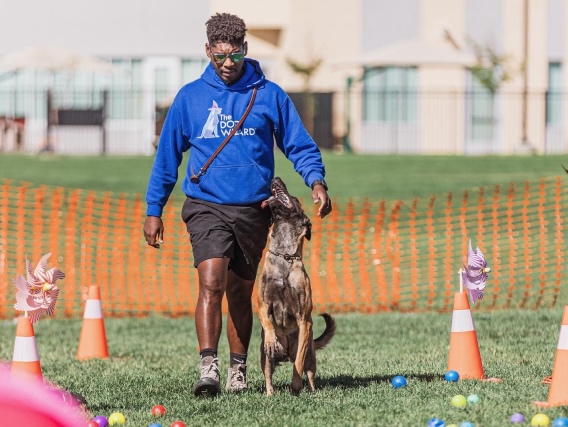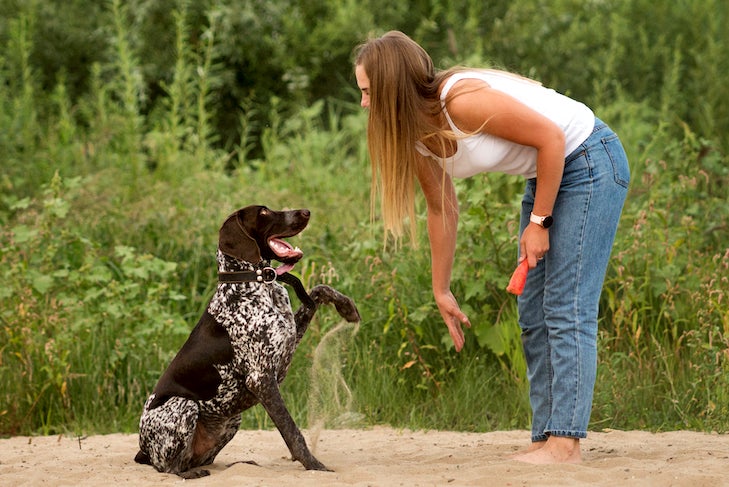Exploring Options for Dog Training Charlotte: What You Required to Know
Exploring Options for Dog Training Charlotte: What You Required to Know
Blog Article
Unlock Your Dog's Possible: Proven Pet Dog Training Methods for Success
Reliable dog training is a nuanced process that pivots on recognizing canine behavior and using medically backed approaches. By integrating favorable support, establishing clear commands, and prioritizing socializing, pet dog proprietors can cultivate a productive connection with their pet dogs.
Recognizing Pet Dog Actions
Comprehending canine behavior is crucial for reliable training and promoting a favorable connection in between canines and their proprietors. A comprehensive grasp of canine body language, vocalizations, and social interactions is critical for identifying their feelings and requirements. Dogs connect largely with non-verbal signs; for instance, a wagging tail might indicate enjoyment, while pinned ears can indicate worry or submission.

In addition, ecological variables play a considerable duty in shaping a canine's habits. Adjustments in routine, new surroundings, or the presence of strange people can cause anxiety or stress and anxiety in pets. Recognizing these triggers enables proprietors to reduce unfavorable reactions and create suitable training techniques.
Eventually, a deep understanding of canine habits lays the foundation for effective training methods, improving both actions and the general bond in between the pet dog and its owner. dog training near me. This understanding is vital for fostering a well-adjusted, delighted canine friend
Favorable Support Methods
Effective training depends greatly on favorable support techniques, which have actually been shown to generate substantial cause forming preferred actions in pets. This technique includes awarding a pet for displaying particular habits, consequently raising the probability that these actions will be duplicated. Incentives can take numerous forms, consisting of deals with, appreciation, playthings, or playtime, relying on what motivates the specific pet dog.

It is vital to slowly phase out benefits as the canine discovers the behavior, transitioning to recurring reinforcement. This method preserves the habits over time while avoiding dependency on constant incentives. By concentrating on favorable support, trainers can cultivate a relying on partnership with their canines, promoting a cooperative and healthy and balanced training atmosphere that improves overall obedience and performance.
Establishing Consistent Commands
A fundamental facet of effective pet training is the establishment of constant commands. Consistency in commands is essential for reliable interaction in between the pet and the instructor. When commands are consistent, dogs discover to link particular words with wanted habits, which accelerates the training procedure and boosts understanding.
To establish consistent commands, it is essential that all member of the family make use of the same terms and gestures. As an example, if one person utilizes "sit" while an additional claims "take a seat," it can produce complication for the pet. Select clear, distinct words for commands and make certain everyone involved in the Going Here canine's training abides by these selections.
Enhance commands with frequent practice, guaranteeing that the canine obtains ample possibilities to react correctly. When a pet dog successfully complies with a command, prompt positive reinforcement must adhere to.
Finally, hold your horses. Establishing constant commands takes some time and effort. With devotion and quality, you will help your dog create a solid understanding of expectations, eventually leading to a well-behaved friend.
Socialization and Direct Exposure
Socializing a canine is crucial for fostering a well-adjusted and certain buddy. This process includes exposing your dog to a range of atmospheres, individuals, and other animals to develop their social skills and flexibility. Early socializing, preferably between the ages of 3 to fourteen weeks, is vital, as it prepares for a pet's future behavior.
Throughout socialization, goal to provide favorable experiences in various setups, such as parks, active roads, and homes with various other family pets. Introduce your dog to different stimulations, including audios, views, and smells, making sure that each experience is satisfying. This direct exposure aids mitigate anxiety and stress and anxiety, leading the way for an extra durable pet dog.
Involving in regulated group play sessions with other pets can additionally boost social skills, teaching your pet discover this info here dog appropriate interactions and limits. Focusing on socialization will significantly contribute to your canine's overall happiness and actions throughout their life.
Conquering Common Training Difficulties

Another frequent issue is diversion. Dogs might have a hard time to focus in unfamiliar or hectic setups. Slowly desensitize your canine to interruptions by starting training in a peaceful environment and slowly presenting even more stimuli as they become proficient (Dog training). Positive support techniques, such as treats and praise, can keep motivation and focus.
In addition, behavior problems like jumping or excessive barking can come to be discouraging. Address these by educating alternate actions, such as resting steadly when welcoming visitors. Uniformity and persistence are essential; strengthen preferred actions constantly and prevent scolding, which can result in complication.
Last but not least, recognize that each dog is distinct, and training timelines may differ. Tailor your technique to your pet dog's individual requirements, and seek expert support if required. With determination and the best techniques, getting over these challenges can result in a well-trained, satisfied canine companion.
Final Thought
In final thought, opening a pet dog's potential demands a comprehensive technique that integrates an understanding of canine habits, the application of positive reinforcement methods, and the facility of constant commands. Early socializing and direct exposure to diverse environments better enhance a dog's versatility and confidence. By dealing with typical training challenges with tailored strategies and perseverance, a cooperative and unified partnership between pet dog and trainer can be cultivated, eventually resulting in a well-behaved friend qualified of prospering in various scenarios.
Efficient canine training is a nuanced procedure that hinges on recognizing canine behavior and employing scientifically Get the facts backed strategies.Understanding dog actions is crucial for efficient training and cultivating a favorable relationship between canines and their owners.Effective training counts greatly on positive support methods, which have been shown to generate considerable results in shaping desired actions in dogs. When commands are consistent, canines discover to associate certain words with wanted habits, which speeds up the training procedure and enhances understanding.
In final thought, unlocking a pet dog's possible necessitates a thorough approach that integrates an understanding of canine actions, the application of positive support techniques, and the establishment of constant commands.
Report this page